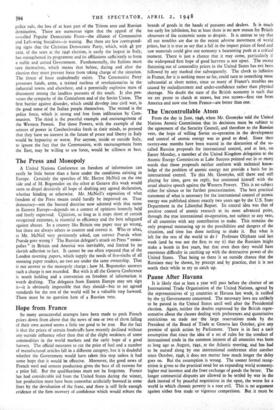Hope from France
So many unsuccessful attempts have been made to push French prices down from above that the news of one or two of them falling of their own accord seems a little too good to be true. But the fact is that the prices of certain foodstuffs have recently declined without any outside influence other than that of the slight weakness of some commodities in the world markets and the early hope of a good harvest. The official measures to cut the price of fuel and a number of manufactured articles fall in a different category, but it is doubtful whether the Government would have taken this step unless it had some hope that it would be effective. Moreover, the good news of French steel and cement production gives the best of all reasons for a price fall. But the qualifications must not be forgotten. France has had considerable aid from the United States during the winter, her production must have been somewhat artificially boosted in some lines by the devaluation of the franc, and there is still little enough evidence of the firm recovery of confidence which would release the hoards of goods in the hands of peasants and dealers. It is much too early for jubilation, but at least there is no new reason for British observers of the economic scene to despair. It is untrue to say that all our troubles are due to the recent adverse movement of world prices, but it is true to say that a fall in the import prices of food and raw materials could give our economy a heartening push at a critical moment. There is just a chance that it may come, particularly if the widespread first hope of good harvests is not upset. The recent flattening out of commodity prices in the United States has not been followed by any marked rise subsequently. The check to inflation in France, for it is nothing more so far, could turn to something more substantial at short notice, since so many of France's troubles are caused by maladjustment and under-confidence rather than physical shortage. No doubt the state of the British economy is such that we are prone to clutch at straws, but two straws—first one from America and now one from France—are better than one.






























 Previous page
Previous page